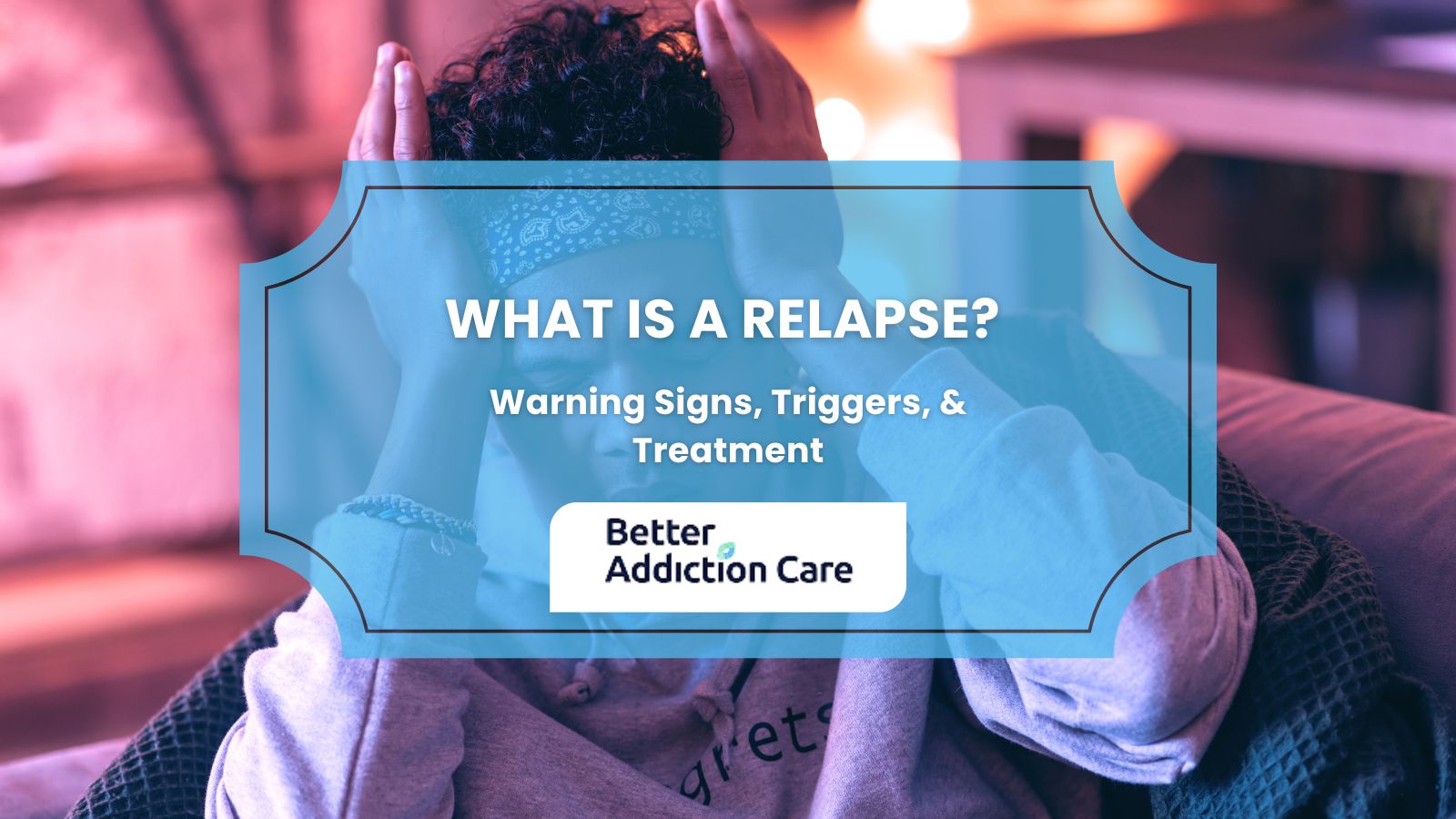Methadone Clinics? Definition, Benefits, Reasons, How It Works and Rules
A methadone clinic provides medication-assisted treatment (MAT) using methadone to manage opiate dependence. This treatment reduces withdrawal symptoms and cravings, blocks the effects of other opioids, and improves your daily functioning under strict regulations.
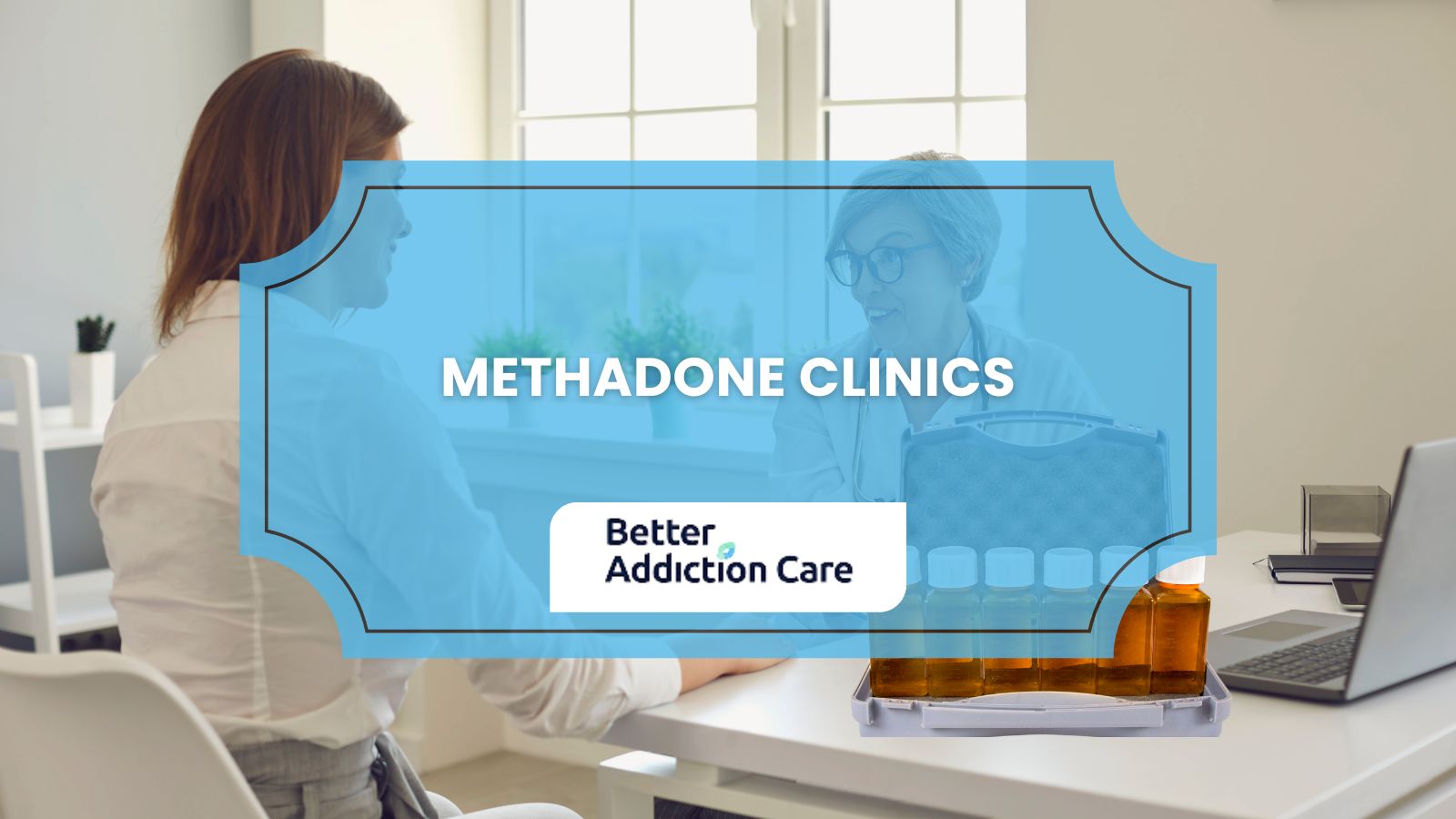
A methadone clinic provides medication-assisted treatment (MAT) using methadone to manage opiate dependence. This treatment reduces withdrawal symptoms and cravings, blocks the effects of other opioids, and improves your daily functioning under strict regulations.
You choose a methadone clinic for several reasons: to reduce opioid cravings and withdrawal symptoms, block the effects of other opioids, receive supervised treatment, access comprehensive care, manage withdrawal, lower relapse and overdose risks, and ensure a legal and accredited environment.
Methadone treatment works by binding to the same brain receptors as heroin, reducing cravings and withdrawal symptoms without causing a high.
According to Wakeman, S. E.’s 2020 study, ‘Comparative effectiveness of different treatment pathways for opioid use disorder, ’methadone was associated with a 76% reduction in opioid overdose risk at 3 months and continued protection at 12 months with a 59% reduction.
What is A Methadone Clinic?
A methadone clinic is a medical facility where individuals receive opiate replacement therapy, also known as medication-assisted treatment (MAT).
The World Health Organization classifies methadone as one of the “essential medicines” for opiate dependence treatment. Methadone is itself an opioid and is therefore used in opiate replacement therapy. A common myth concerning opiate replacement therapy is that one is just replacing one addiction for another; however, the amounts that are dispensed in liquid, pill, or wafer form are not enough to cause any kind of “high”. Therefore, it only helps to reduce withdrawal symptoms and cravings, thus improving the success of treatment.
Methadone clinics are generally separated as being either private or public. Strict federal and state laws help to ensure that the use of methadone is controlled. Only around a third of all opiate addicts in treatment receive methadone in one of the methadone clinics.
What are the Benefits of Methadone Clinics?
The main benefits of a methadone clinic as one of the opiate addiction treatment options are listed below.
- Decrease in opiate cravings
- Due to cross-tolerance, it helps block the effects of other opiates
- A significant reduction in withdrawal symptoms
- A return to more normal day-to-day function as the physical need for opiates dissipates
What Are The Reasons to Use a Methadone Clinic?
The reasons to use a methadone clinic include reducing opioid cravings, providing medically supervised treatment, offering comprehensive care services, and creating a structured recovery environment. Methadone clinics help manage withdrawal symptoms while providing access to counseling, therapy, and other supportive services that address the complex nature of addiction.
Listed below are 7 common reasons to use a methadone clinic.
- Reducing Opioid Cravings and Withdrawal Symptoms: Methadone is a long-acting synthetic opioid that activates opioid receptors in your brain. This action reduces cravings and minimizes withdrawal symptoms, helping you avoid the euphoric effects of other opioids like heroin. According to McAnulty, C.’s 2022 study, ‘Buprenorphine/naloxone and methadone effectiveness for reducing craving in individuals with prescription opioid use disorder: Exploratory results from an open-label, pragmatic randomized controlled trial’, methadone reduced opioid cravings by about 4 points over 22 weeks. Patients using methadone had an average craving score of 5.1. Methadone was administered using a standard supervised model of care.
- Blocking Effects of Other Opioids: Methadone blunts or blocks the effects of illicit opioids, reducing your risk of relapse and overdose.
- Supervised and Regulated Treatment: Methadone is a Schedule II controlled substance that requires careful medical supervision. Clinics provide regulated dispensing under federal guidelines, ensuring safe dosage and monitoring.
- Comprehensive Care Beyond Medication: Methadone clinics offer holistic and supportive services, including counseling, behavioral therapy, treatment for co-occurring mental health disorders, life skills training, and aftercare programs. This multi-faceted approach supports your long-term recovery and addresses emotional and social aspects of addiction.
- Withdrawal Management and Residential Treatment: Clinics provide withdrawal management and inpatient care when needed, which is critical for individuals with advanced addiction requiring close supervision.
- Reducing Risk of Relapse and Overdose: By lessening withdrawal symptoms and cravings, methadone treatment helps prevent relapse and the severe consequences of untreated opioid addiction, including accidental overdose. According to Nguyen, H. T. T.’s 2023 study, ‘Opioid relapse and its predictors among methadone maintenance patients: a multicenter, cross-sectional study in Vietnam’, methadone maintenance treatment demonstrated an 87% success rate in preventing opioid relapse, with treatment adherence, longer treatment duration, and strong social support identified as key protective factors.
- Legal and Accredited Treatment Environment: Methadone clinics operate under strict accreditation and certification standards, ensuring you receive evidence-based, safe, and effective treatment.
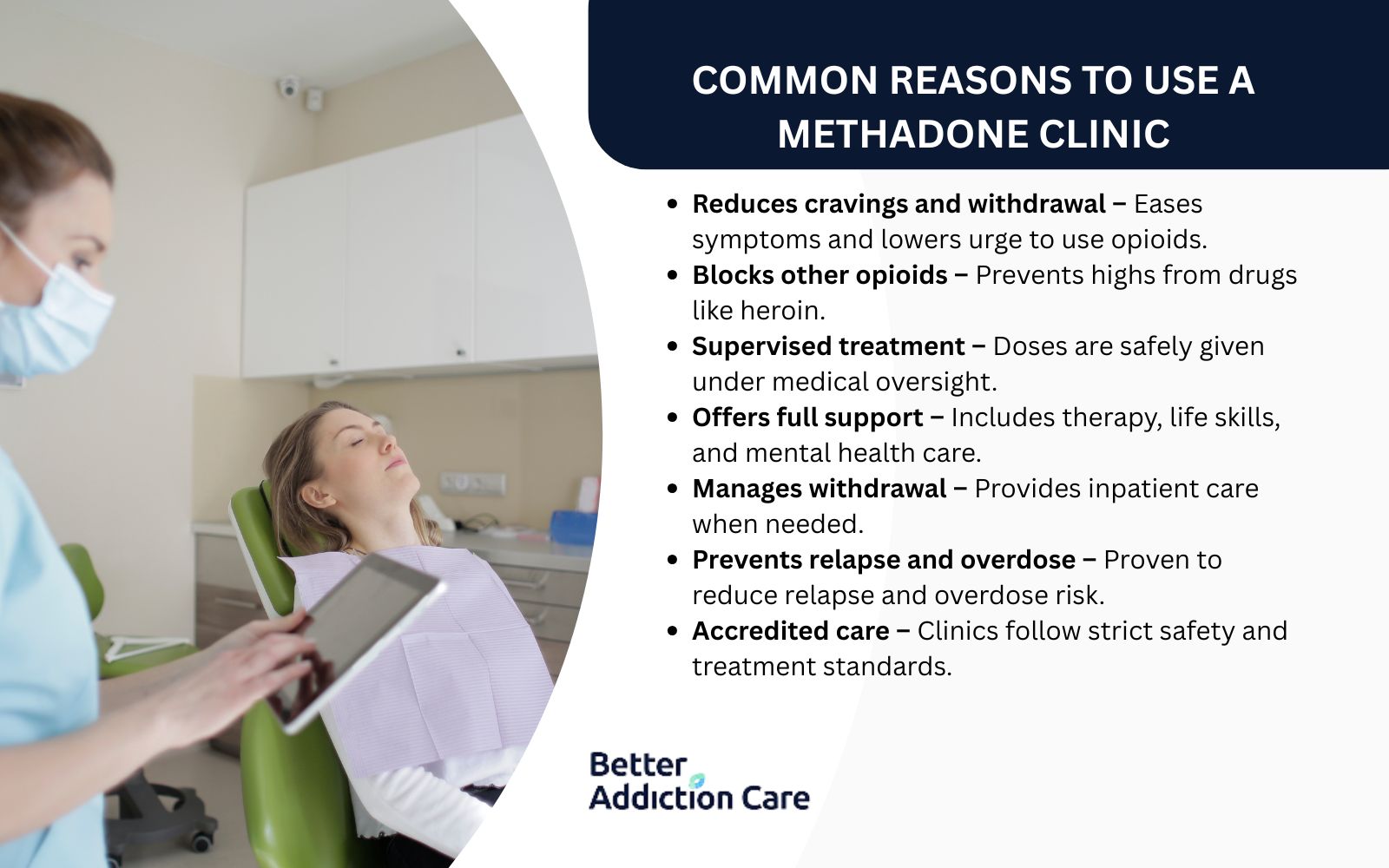
When is Methadone Not The Right Choice?
Methadone isn't the right choice for you if you have a previous addiction to the drug itself, use other opioids or alcohol simultaneously, are pregnant or planning to become pregnant, have seizure disorders, or struggle with sleep apnea or respiratory conditions.
Listed below are 8 common reasons why you shouldn’t use methadone.
- If you have been addicted to methadone before
- If you use other opioid-based drugs or alcohol
- If you take medication for a heart arrhythmia
- If you are pregnant or planning to become pregnant
- If you are prone to seizures, such as those with epilepsy
- If you have a history of head injuries
- If you have low blood pressure
- If you have sleep apnea or other breathing disorders, methadone should not be taken.
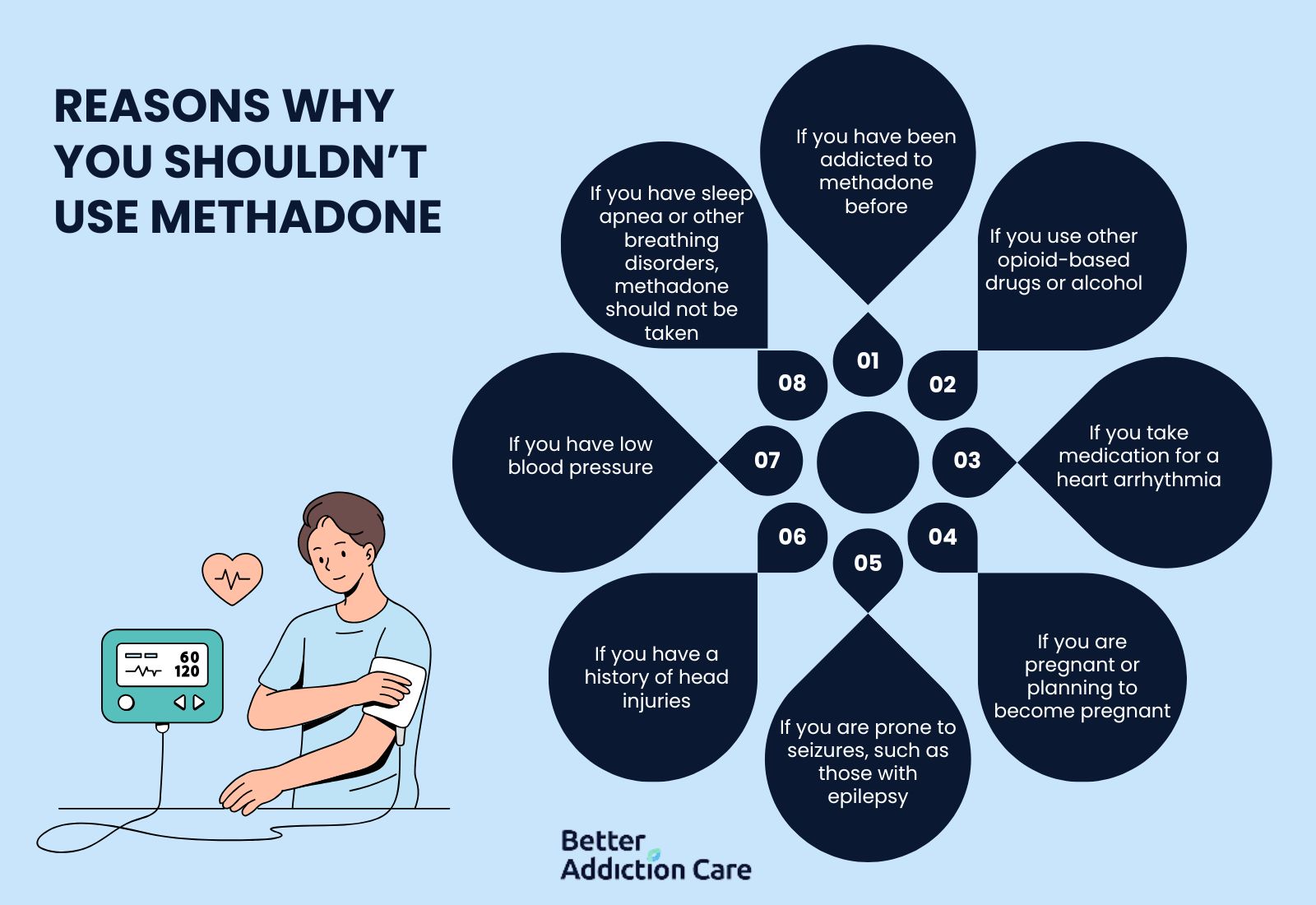
How Do Methadone Treatments Work?
Methadone treatment works by binding to the same opioid receptors in your brain as heroin or other opioids, but acts more slowly. This process reduces cravings and prevents withdrawal symptoms without causing euphoria. You receive methadone daily through certified Opioid Treatment Programs (OTPs), initially under supervision, with take-home doses allowed as you stabilize. Methadone maintenance therapy helps you function normally, maintain employment, and engage in counseling and support services, promoting your long-term recovery from opioid use disorder. The duration of treatment varies, often lasting at least 12 months or longer, depending on your needs and progress.
What Are Some Risks Involved With Methadone?
Some risks involved with methadone include dizziness, nausea, breathing difficulties, mental confusion, and the potential for overdose, particularly when combined with alcohol or other medications. Methadone requires careful dose management, and patients should avoid operating machinery while taking this medication.
Listed below are 8 risks and precautions for using Methadone.
- Dizziness and lightheadedness
- Nausea and vomiting
- Constipation and abdominal pain
- Slow or shallow breathing
- Chest pain and rapid heartbeat
- Mental confusion and hallucinations
- Risk of overdose and respiratory depression
- Dangerous interactions with alcohol and other drugs
- Need for careful dose management and monitoring
- Avoid operating heavy machinery while on methadone
- Store methadone securely and at room temperature
- Seek emergency help immediately if an overdose occurs
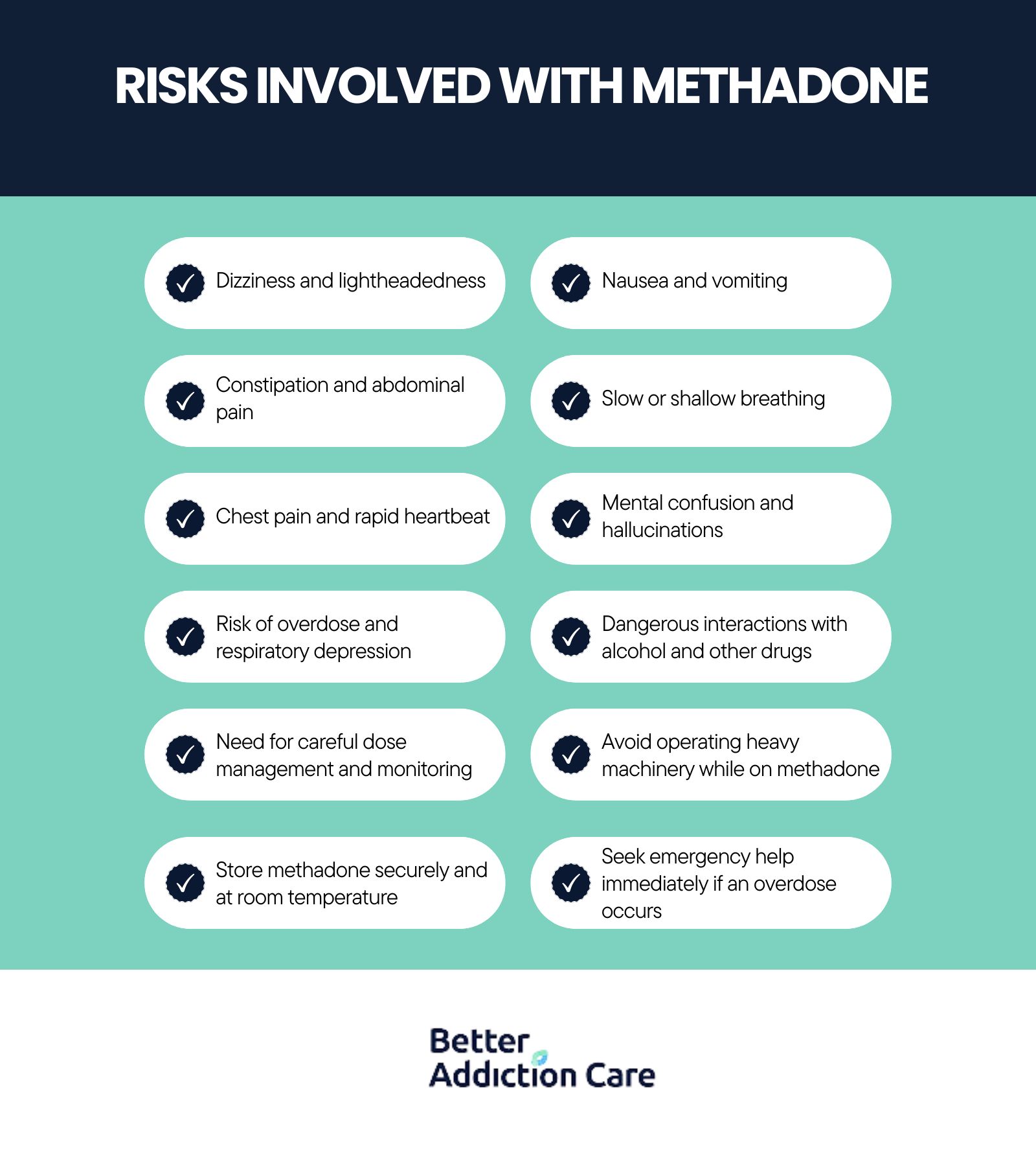
What Information And Tests Are Needed Before Receiving Methadone Treatment?
Information and tests needed before receiving methadone treatment include blood screenings, substance use evaluation, comprehensive health assessment, psychiatric evaluation, and impact analysis.
Here is the common information and tests needed before receiving Methadone treatment:
-
Blood analysis: This test identifies your overall health status and screens for infectious diseases such as HIV and hepatitis. Understanding your health risks before starting methadone treatment is crucial for your safety and well-being.
-
Urinalysis: This test detects the presence of drugs and verifies recent substance use. Confirming your eligibility for treatment establishes a solid foundation for your recovery journey.
-
Drug use history: This review examines your patterns, frequency, and types of substances used. Gaining insight into your history helps guide personalized treatment planning and ensures your methadone dosage meets your needs.
-
Medical history: This assessment covers your past and current physical health conditions. Ensuring that methadone does not interact negatively with any existing conditions or medications is vital for your health.
-
Evaluation of co-occurring mental disorders: This screening checks for conditions like depression, anxiety, or PTSD. Addressing mental health alongside addiction treatment supports your overall recovery and well-being.
-
Assessment of how substance abuse affects your life: This evaluation examines the impacts of substance abuse on your work, relationships, and daily functioning. Understanding the extent of your addiction helps clarify your needs and informs comprehensive care goals, paving the way for a healthier future.
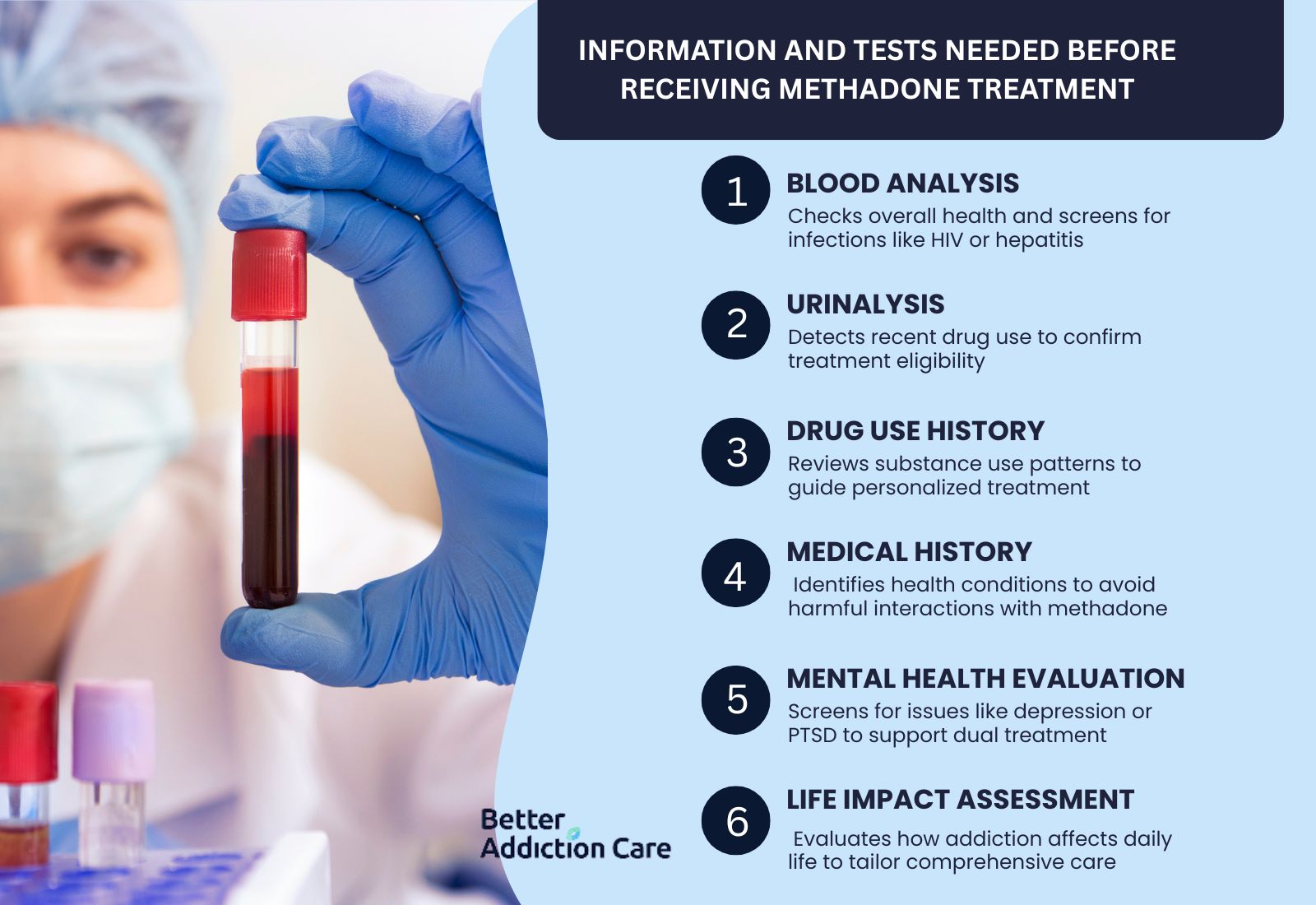
How Do Methadone Clinics Work?
Methadone clinics work by providing medication-assisted treatment (MAT) for individuals recovering from opioid use disorder. You receive methadone, a long-acting opioid medication that helps manage withdrawal symptoms and reduce cravings, enabling you to stabilize your life and focus on recovery. The treatment process includes mandatory counseling and therapy sessions to address the psychological and behavioral aspects of addiction.
Medical professionals closely supervise your treatment in a controlled environment to ensure safety and minimize risks. Initially, you must visit the clinic to receive your methadone dose under direct observation. As you demonstrate progress and compliance with the program, you earn the privilege of take-home doses, gradually building your independence while maintaining your recovery journey.
Are Methadone Clinics Effective?
Yes, methadone clinics are effective at treating opioid dependence, particularly in retaining patients in treatment and reducing heroin use.
According to Mattick, R. P.’s 2009 study, ‘Methadone maintenance therapy versus no opioid replacement therapy for opioid dependence’, methadone maintenance treatment was 3 to 4.4 times more effective at keeping patients in treatment compared to non-methadone approaches, and reduced positive drug tests for heroin by about 34% compared to alternative treatments.
How Do You Find Local Methadone Clinics Close To You For Drug Rehab?
To find a local methadone clinic closest to you for drug rehab, search online databases like SAMHSA's treatment locator, which lists certified opioid treatment programs. Contact your health insurance provider to identify covered clinics in your network. Ask your primary care physician for referrals to reputable facilities in your area. State health departments maintain lists of licensed methadone clinics and provide information about funding options.
Our online drug rehab finder helps you with local drug rehab options in your area, including methadone clinics nationwide, offering comprehensive medication-assisted treatment programs. The search tool matches individuals with appropriate treatment options based on their needs, location, and insurance coverage. Free insurance verification helps determine coverage for methadone treatment at facilities accepting various payment options. You can call us at (800) 429-7690 to speak with a compassionate and knowledgeable addiction specialist. This specialist will guide you through the entire process of seeking help.
Related Articles
Treatment Centers in Virginia





